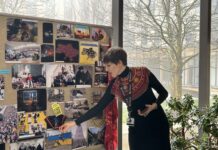A dementia search-and-rescue initiative initiated and led by Lili Liu, Dean of the Faculty of Health, is aiming to scale up strategies that enhance training, improve data collection, coordinate community resources and prevent repeat missing incidents.
This new initiative recently secured $2.1 million-dollar funding from the federal government under their Search and Rescue New Initiatives Fund (SARNIF). SARNIF is designed to enhance the effectiveness, efficiency, economy, and innovation of search and rescue activities with regards to the response and prevention objectives determined by Canada’s search and rescue community.
The three-year funding will allow Liu, together with her co-investigator, adjunct assistant professor Antonio Miguel Cruz, and her team, to advance their project called “Managing Risks of Going Missing among Persons Living with Dementia by Building Capacities of SAR Personnel, First Responders and Communities.”
While dementia is a broad term, some of its symptoms refer to a loss of memory, language, and other thinking abilities that interfere with daily life. While dementia is more common among adults over the age of 65, it can still affect people as young as in their 30s. Dementia typically has three progressive stages, each more severe than the previous one.
Liu’s project aims to build partnerships and increase coordination with various establishments and build capacity within the search-and-rescue community while managing the risks of missing persons living with dementia.
In addition to developing partnerships in seven provinces — Ontario, British Columbia, Alberta, and Nova Scotia — the team will also work with the Peguis First Nation in Manitoba and with Kahnawake Search and Rescue in the Kahnawake Mohawk Territory in Quebec. First responders in these two Indigenous communities will observe some enhanced protocols developed by the project as the impact of dementia in Indigenous communities is approximately 34 per cent higher than in non-Indigenous populations.
The Honourable Bill Blair, President of the Queen’s Privy Council and Minister of Emergency Preparedness, acknowledges that the population is aging and along with it, the number of people who go missing due to dementia is increasing.
“Through this partnership with the University of Waterloo, we will be able to build capacities, partnerships, and coordination of search and rescue personnel, first responders, and communities to manage risks among persons living with dementia, and keep these vulnerable members of our communities safe,” Blair said.
According to the Alzheimer’s Society of Canada, there are over 500,000 Canadians currently living with dementia. This number is projected to reach 900,000 by 2030.
Liu believes that the increasing number of Canadians living with dementia at risk of going missing is a public health concern.
“This new initiative emphasizes the importance of ensuring safe communities for Canadians. The increasing numbers of Canadians living with dementia at risk of going missing is a public health concern,” Liu said.
Research also shows that if a missing person with Alzheimer’s disease is not found within 24 hours, the situation becomes an emergency as there is a 50 per cent chance that they will be found injured or dead from hypothermia, dehydration, or even drowning. This makes it one of the predominant factors on why the first 24 hours are crucial and integral to their safety and well-being.
Marria Khalid, a third-year UW biomedical student and co-president of Brain Exercise Initiative, a club that works with local retirement homes and Alzheimer’s patients, is working with Liu. She strongly acknowledges the need for such initiatives and hopes to spark a change in her community.
“Missing individuals with dementia is a growing concern. Working with a team filled with enthusiastic individuals on this important initiative is rewarding. We hope to contribute to ensuring safe communities through informing and developing preventive strategies to reduce these incidents and keep this population safe,” Khalid said.
Under this new project UW is aiming to work with partners and affiliates to evaluate and implement four initiatives: a rapid response protocol for first responders in seven provinces including the two Indigenous communities in Manitoba and Quebec, toolkits for communities, guidelines for return home interviews to prevent missing accidents and data collection approaches to monitor the issue.































